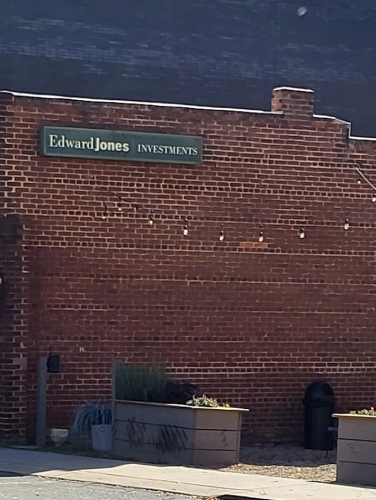
Potts Barber Shop
(ca. 1923)
The Stough-Cornelius/Potts Barber Shop building offers a unique narrative of Cornelius’ history, ranging from the rise and fall of the southern cotton industry to the end of Jim Crow segregation.
21324 and 21328 Catawba Ave., Cornelius, NC 28031
These two separately constructed brick storefronts, joined by a shared central wall and façade, are known in full as the Stough-Cornelius/Potts Barber Shop building. The west-side storefront (21328 Catawba Avenue) was constructed in 1923 by the Stough-Cornelius Company, whose original shareholders included Town of Cornelius founder R.J. Stough and town namesake J.B. Cornelius. The east-side storefront (21324 Catawba Avenue), constructed at some point between 1923 and 1938, has housed since 1960 the Potts Barber Shop, generally regarded as the oldest ongoing business continuously owned or operated by an African American entrepreneur in Cornelius, and perhaps in north Mecklenburg County.
Property Quick Links
The Stough-Cornelius/Potts Barber Shop building is one of only seven remaining early 20th century commercial buildings fronting what was once Cornelius’ bustling business and local government corridor of Catawba Avenue. The individual histories of the joined structures offer a unique narrative of the town’s development, both as to the local economic growth driven by the traditional southern cotton industry of the late 19th and early 20th centuries, and the entrepreneurial achievements and community efforts of rural African Americans in the face of decades of Jim Crow segregation.
Started in 1891, the Stough-Cornelius Cotton Mill provided the impetus for the settlement and incorporation of the town of Cornelius. This building is the final remaining structure representing that company. In later years, the former Stough-Cornelius building also headquartered the Cornelius Electric Membership Corporation, the town’s first electric cooperative formed in 1940 under the sponsorship of the federal government’s Rural Electric Administration.
The Potts Barber Shop building is notable in part for its 60+ year multigenerational association with the family of Wilson Henry Potts (1912-2000), an early civic leader of Smithville, one of the oldest African American communities in north Mecklenburg County. Potts, who first learned barbering in 1926 at the age of 14, began working as a full-time barber in the 1940s on Brick Row, a series of shops once located near the intersection of Main Street and Catawba Avenue. He first worked for Black barber Rutledge Norton, then for White barber Clarence Blakely. Both shops were segregated, catering only to a White clientele. Blakely and Potts were likely Cornelius’ first interracial barber team. In the 1950s, Potts purchased Blakely’s shop, moving the renamed Potts Barber Shop to the present location in 1960. There, the barber shop began its longstanding role as a prominent center of social activity for the town’s male population. In 1972, Potts welcomed Black customers, making Potts Barber Shop the town’s first racially integrated barber shop.
Wilson Potts was also a pillar of Smithville’s African American community. Starting in the 1950s, he played an integral in bringing running water, sewer and electric service, street lights, and paved roads to Smithville, all long before the community’s 1980 incorporation into the town of Cornelius. In the early 1950s, Wilson and four other men founded the Smithville Better Community Club and led the community’s efforts to raise funds to purchase the then-unused Smithville Rosenwald School and convert the building into a community center.

